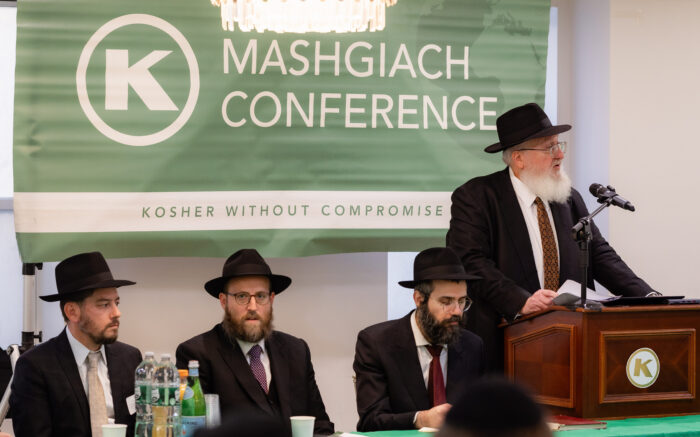Ben Gurion Airport, April, 1998. The airport was abuzz with activity as thousands of yeshiva and seminary students headed home for Pesach, and finding a minyan was as easy as finding a falafel stand in Jerusalem. We looked like many of our fellow travelers; ten American rabbinical students clad in black hats and jackets, dragging battered suitcases through the terminal. But unlike our peers, we were not headed home to enjoy the holiday with family. Our destination was Crimea, Ukraine.
It was almost a decade since the Iron Curtain had fallen and the tens of thousands of Jews in the former USSR were now free to practice their religion. But years of religious persecution under the Communist regime had taken their toll and while the Ukrainian Jews may have been fluent in the works of Pushkin, Stalin had seen to it that they were ignorant of their own rich history and culture.
We were sent to Crimea through Merkos Shlichus, a program in which Lubavitch rabbinical students visit communities with little or no formal Jewish infrastructure in order to meet the religious needs of the local Jewish residents. This is how my friends and I found ourselves on the way to Ukraine, the very country where my grandfather sat in prison for simply being a yeshiva student. There, we would celebrate the Festival of Freedom with those that had personally experienced their liberation.
The flight from Ben Gurion to Simferopol Airport was a mere two and a half hours. Simferopol, too, was teeming with travelers, but both airports were polar opposites. While conversation and laughter flooded Ben Gurion, here there seemed to be an unwritten rule forbidding the passengers from speaking. It didn’t take long for us to start attracting strange looks. Maybe it was our openly Jewish garb, or maybe it was because we were the only ones with enough chutzpah to talk while under the hostile scrutiny of the security guards. But hey, Communism was a thing of the past.
Upon arriving at the Chabad Center we met with the shaliach, Rabbi Lipscyz, and were introduced to some of the Chabad House employees. We met the friendly driver named Sasha, a cheerful secretary named Sasha, and a paintbrush-wielding handyman named… Sasha. Our plans were straightforward. We would be split into pairs and travel to our allocated Crimean cities. Our responsibilities would include cleaning and kashering a commercial kitchen, preparing the menu, purchasing the produce, preparing the meal, and finally conducting the Pesach seder. Shmuel and I were to go to Feodosiya, a quaint resort town on the Black Sea coast. We were a pair of eighteen year old rabbinical students living the carefree dorm life, and our culinary talents were limited to brewing a cup of coffee, but that didn’t bother us. At eighteen, you’re still invincible.
The matzah and wine were packed and we departed for Feodosiya. After being welcomed by our translator and the local Jewish community representative, we settled into our hotel room for a brief rest. We then began what would be a two and a half day kashering process that would make the kitchen and utensils fit to prepare food for the seder. Immediately we began challenging stereotypes. Teenage boys are not particularly known as being overly concerned with cleanliness, and our Ukrainian friends were quite baffled when we entered what they thought was a perfectly clean kitchen and proceeded to scrub the kitchen with an obsessive vigor. They were not quite sure what to make of us; two eighteen year-old religious Americans cleaning obsessively while our mothers were several thousand miles away.
Once the kitchen was scrubbed to our satisfaction, it was time to kasher the gas ranges. This was done by igniting the fires under the grates until they became red hot. Huge pots were then filled to the brim with water and placed on the ranges to boil. Upon reaching boiling point, hot bricks that were heating up on the ranges were dropped in causing boiling water to overflow from the pots. Smaller pots and utensils were kashered by submerging them into a boiling pot of water. The stainless steel sink was kashered by pouring even more boiling water over it. We boiled what seemed like enough water to fill a canal, and immersed every single utensil. The process seemed endless. It was quite a workout, too.
Finally it was time to kasher the stainless steel counter. This was done by running a blowtorch over the entire surface. We were proud of how quickly we were picking up the Ukrainian language; our vocabulary was almost in the double digits. Unfortunately the word for blowtorch was not yet part of that vocabulary. And even more unfortunate was the fact that neither was it in the vocabulary of our translator. Our numerous descriptions and hand gestures for "blowtorch" were fruitlessly rewarded. A pack of matches, a lighter and a cigarette…Our translator was becoming increasingly exasperated. We would have gone down to Home Depot to pick one up ourselves, but alas there is no Home Depot in Feodosia. And so we decided to resort to Plan B: We would call the Chabad House in Simferopol and have someone explain it in Russian. Simple. It was not that simple we soon found out. There was no phone on the premises, so we had to trek to the closest phone station. We prepaid for our call at one of the counters and then proceeded to our booth. A short while later we had our precious blowtorch. And for anybody else planning on making this trip, the word for blowtorch is паяльна лампа. If only we had Google Translate then…
After a two and a half day boot camp of extreme cleaning, the kitchen was kosher for Pesach and our muscles were aching. With our menu in hand we hit the Feodosia market. There, we instantly made ourselves popular. Vendors vied for our attention as we purchased in minutes more food than they sold all week. After piling our carts high with sacks of potatoes, onions, carrots and beets, and even fresh kosher fish, we headed back to the hotel. Now all we had left to do was prepare the food.
We were proud of how quickly we were picking up the Ukrainian language; our vocabulary was almost in the double digits. Unfortunately the word for blowtorch was not yet part of that vocabulary. And even more unfortunate was the fact that neither was it in the vocabulary of our translator.
We didn’t have much experience catering large-scale events, so we hired a cook and kitchen staff to prepare the food according to our specific guidelines, using only the ingredients that we provided. In accordance with the Kosher for Pesach ingredients available, our menu was simple but delicious – eggs, vegetable soup, potatoes and fish… Actually, it was not that different to many Pesach menus back at home. Cooking for 150 people requires peeling a lot of potatoes. We helpfully offered the cook a potato peeler to tackle the mountain of spuds, but she shook her head adamantly. Her loyalties belonged to her knife, not this strange American contraption. I don’t know how she did it but she managed more than fine without a peeler. Shmuel and I made the maror and charoses and washed the lettuce for the seder plate.
The seder night arrived. Shmuel and I celebrated with family, conducting the seder for 150 of our Jewish brothers and sisters. Together we sang the timeless Pesach classics, crunched on matzah and enjoyed the holiday meal. With the help of our translator we went through the Haggadah, recounting the story of our Exodus from Egypt, one sentence at a time. The story was one I had learned every year since kindergarten. I made the arts & crafts as a five year old, proudly read from my own Haggadah at seven, and studied dozens of commentaries throughout my years in yeshiva. But watching the Feodosian Jews drinking in the story of our liberation as they heard it for the first time, I realized that their appreciation for Pesach went deeper than eighteen years of study. For them Yetzias Mitzrayim was more than just a story. It was reality.


 EN
EN  ZH
ZH  KR
KR  BR
BR  ES
ES  IN
IN  IL
IL 




